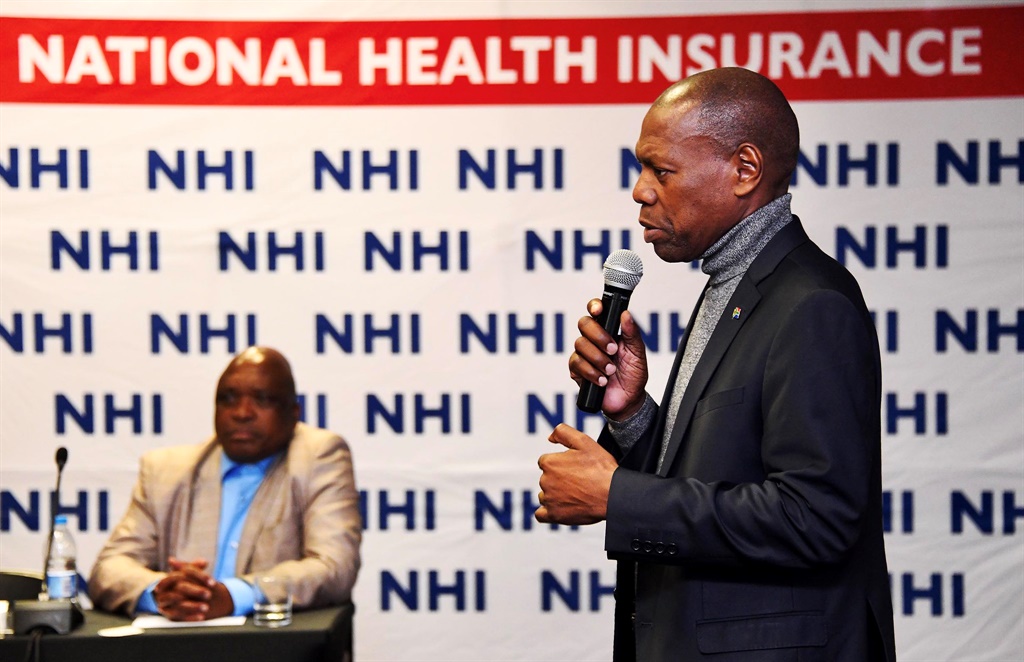
The recent suspension of Professor Ebrahim Variava and the subsequent lifting of his suspension briefly placed the North West department of health in the national spotlight – a department that has been under administration for more than two years.
Marcus Low asks whether the latest developments are just a blip on the department’s road to recovery, or if they are symptomatic of deeply entrenched dysfunction.
Spotlight reported on Monday that the controversial suspension of prominent North West clinician Professor Ebrahim Variava was lifted following a significant public outcry.
But while Variava is back at work, many other senior employees of the North West health department remain suspended – including six directors and five deputy directors.
From dodgy contracts with the Gupta-linked company Mediosa and the ambulance company Buthelezi EMS, to crippling strikes and ongoing medicine stockouts, the province’s health department has been in the headlines for many of the wrong reasons in recent years.
Read: ‘I’ve been vindicated’: Joy as prominent North West doctor’s suspension is lifted
It came as little surprise when, in April 2018, Cabinet placed the department under administration, and deployed deputy director-general for primary healthcare Jeanette Hunter to act as administrator.
Since then, the former head of the North West department of health, Thabo Lekalakala, has been fired and charged with fraud, but how much has changed beyond that? What is the situation in the department more than two years after it was placed under administration?
Are the recent medicine stockouts and the suspension of Variava just blips on the department’s way to recovery, or is it symptomatic of deeply entrenched dysfunction in the department?
Trusted sources in the province suggest not much has changed, but since the department is under administration, we sent a set of questions to the national health department to get its side of the story.
We received a detailed set of responses approved by Deputy Health Minister Joe Phaahla. We draw on these responses in the below analysis.
1. Medicine stockouts
Sometimes medicines are out of stock because of global shortages – something provinces can’t do much about. But often medicines are out of stock because of dysfunction at depots and because of suppliers not being paid.
Such management-related factors are under the control of provinces and probably explains much of the variation between provinces with stockouts.
At the beginning of last month, the director of affordable medicines at the national department of health, Khadija Jamaloodien, told Spotlight that the two provinces most severely impacted by medicine stockouts were North West and Limpopo.
A survey conducted by the Stop Stockouts Project during South Africa’s lockdown found that North West and the Free State were the two provinces experiencing the most serious supply issues. Spotlight also reported in May on a long list of medicines that were out of stock in North West.
According to Phaahla, medicine availability in the province’s hospitals improved from 65% in May 2018 to an average of 82% last year and dropped to 77% in March.
While there has been some marginal improvement, how is it that, more than two years after being placed under administration, North West still has some of the country’s worst stockouts?
One reason appears to be that some suppliers haven’t been paid for years.
“Availability in this area is being negatively affected by a large number of backlog payments [as far back as 2014] that were only discovered in June 2019,” says Phaahla. “A large number of invoices for these payments are in the process of being reconciled.”
He suggests that these unpaid bills were only picked up because of improvements in pharmaceutical management that came about because of the national intervention.
A second related reason for the province’s ongoing stockouts has to do with management shortcomings, both in the department and at the medicines depot. In February last year, four employees were suspended, ostensibly in an effort to sort out these problems. More than a year later, the four employees remain suspended and stockouts remain a problem.
Phaahla claims that there is now “improved human resources and management capacity”, resulting in “transparent accounting processes” at the depot.
But he also says that, for sustained improvements in this area, new managers need to be appointed to oversee the pharmaceutical operations, however, “this has to await the outcome of the disciplinary process”.
The disciplinary process here refers to the four employees who have already been on suspension for more than a year.
2. Emergency medical services
In April 2018, we reported in Spotlight’s Health4Sale investigative series how the North West department of health used more R100 million ear-marked for HIV to pay the private ambulance company Buthelezi EMS and how the department allegedly overpaid for Buthelezi EMS’s services.
Then minister of health Aaron Motsoaledi asked National Treasury to investigate. In July last year, President Cyril Ramaphosa signed a proclamation tasking the Special Investigating Unit with looking into the contracts with Buthelezi EMS.
Some of our sources in the Free State and North West argued that there was a deliberate attempt in these provinces to reduce public sector capacity to open the door for Buthelezi EMS.
The evidence that there was such a deliberate effort is circumstantial, but compelling.
Either way, in North West at least, it seems the tide has now turned back to in-sourcing and building the state’s ambulance capacity.
“In 2018, the department deployed 38 new ambulances and, in 2019, 48 new ambulances and 20 planned patient transport vehicles,” according to Phaahla.
He also said that 20 advanced life-support paramedics had been appointed and that issues around the payment of overtime to EMS staff has been sorted out.
We also asked whether any funds had been recovered from Buthelezi EMS given the alleged overcharging. Phaahla responded: “Buthelezi EMS claimed R285 184 059 for services rendered to the North West health department.
A service-to-invoice reconciliation and verification process could only confirm R222 182 473, and only this amount will be paid to Buthelezi EMS after this company’s issues with the SA Revenue Service has been resolved.”
In other words, they found that Buthelezi EMS overcharged the department by R62 million. That this kind of thing is being picked up and acted on is certainly a step in the right direction.
3. Governance and finances
For someone in government, Phaahla is refreshingly frank about the governance challenges in North West.
He writes: “The breakdown in leadership and governance was one of the issues that was identified in the situational assessment at the start of the intervention. Corruption and flouting of procedures was, and are in some areas, still rampant.”
He goes on to mention “numerous expired contracts linked to key services”, “flouting of regulations”, “lack of capacity”, “indications that the inefficiencies in supply chain management were being deliberately perpetuated”, and that “corruption was found to be pervasive throughout the department, at all levels”.
But while acknowledging that some problems persist, Phaahla insists that they have made significant progress over the past two years.
“The intervention began with a work plan based on a diagnostic assessment. The work plan contains 111 activities and, to date, 74% of these activities have been achieved.
Read: Covid-19: The big wave is coming
"The intervention has been successful in bringing about necessary stability to the North West health department. The problems found by the intervention team were many and complex. As pointed out above, two-thirds of these have been resolved, while a third is still being addressed. The most stubborn of which relate to supply chain management issues.”
Labour relations also seem to have improved somewhat over the past two years. The province’s healthcare system has not again been paralysed by strikes as it was in 2018. On paper, there is certainly much that creates an impression of progress.
One area that the department clearly does not have fully under control, however, is its finances, with accruals of more than R1 billion.
The DA lays the blame for the department’s ongoing money problems at Hunter’s door.
“The inability of Hunter to successfully steer the department out of its dire financial straits since her appointment speaks volumes and should be enough reason for her to step down,” it said in a recent statement.
4. Human resources and suspensions
Over the two years of administration, the vacancy rate in the North West health department has decreased marginally from 20% to 18%. The vacancy rate for senior management posts have dropped from 31% to 26%.
Adding to these high vacancy rates, the department also has a significant number of suspensions, especially at more senior levels.
“The administration has found unresolved disciplinary cases [fraud, corruption, misconduct] going as far back as 2012,” according to Phaahla.
“The administration has now cleared these up to 2017 and now has 58 pending cases. Of these, 26 individuals are suspended.”
A total of 26 suspensions does not sound like much, given that, according to Phaahla, the province has 21 000 employees. But, according to Tebogo Lekgethwane, the spokesperson for the province’s health department, six directors and five deputy directors are suspended.
This is concerning as these suspensions come on top of the already high senior management vacancy rates.
In addition, of the 26 suspensions, 11 have been in place for more than six months “due to the nature and complexity of the investigations”.
Given all the alleged corruption and the serious supply chain management problems in the department, some suspensions are to be expected. This is certainly the line taken by Phaahla.
But, as the case of Variava’s suspension has shown, not all suspensions are necessarily warranted. In fact, in talking to sources in the province, we believe there is at least one, but probably a few more, highly competent people in the department who are currently suspended who should not be suspended.
5. What happens next?
One common refrain we’ve heard from people in national government throughout the years is that placing a provincial department under administration gives you responsibility without giving you much power.
The validity of this concern is arguable since, legally, administrators do in fact have significant powers. Maybe the more important question regarding power is how much political and technical backing the administrator has.
A related concern is that national departments don’t typically have teams of high calibre managers waiting around ready to be deployed to provinces.
There has been no indication that Hunter has lost the confidence of Phaahla and Health Minister Zweli Mkhize and, accordingly, it seems very unlikely that they will bend to the DA’s wishes and replace Hunter with a new administrator.
Much more likely is that Hunter will stay on until the department is taken out of administration – something that might happen relatively soon given that the minister approved “a road map for exit of administration” in July last year.
Whether the department will be ready to manage its affairs efficiently, fairly and lawfully once it exits administration, remains to be seen.
This article was produced by Spotlight – health journalism in the public interest.
| ||||||||||||||||||||||||||||||
 |




 Publications
Publications
 Partners
Partners











